The Massachusetts Institute of Technology published an article yesterday falsely claiming climate change causes more frequent and intense severe weather events. The article, titled “$25 million gift launches ambitious new effort tackling poverty and climate change,” asserted an avalanche of fake climate claims to justify a huge donation to MIT. Well, at least MIT demonstrated which side of the climate debate benefits from the vast majority of climate activist money.
“As vast as its effects may be, climate change also presents a diverse set of problems to tackle. Among other things, climate change, as well as fossil-fuel pollution, is expected to … increase the prevalence of … extreme weather events, wiping out homes, livelihoods, and communities,” writes Peter Dizikes, the author of the article.
The facts say just the opposite.
Concerning drought, data from the National Integrated Drought Information System (NIDIS) shows droughts have not become more frequent or severe in recent years.
Indeed, Climate at a Glance: Drought reports the United States is undergoing its longest period in recorded history without at least 40 percent of the country experiencing “very dry” conditions, with peaks in drought around 1978, 1954, 1930, and 1900 being much larger than what the U.S. has experienced in the 21st century and the late 20th century. Indeed, in 2017 and 2019, the United States registered its smallest percentage of land area experiencing drought in recorded history.
And the U.N. Intergovernmental Panel on Climate Change (IPCC) reports with “high confidence” precipitation over mid-latitude land areas of the Northern Hemisphere (including the United States) has increased during the past 70 years, while IPCC has “low confidence” about any negative trends globally.
Regarding wildfires, drought is the key contributing climate factor. Therefore, one should not be surprised to find, as reported in Climate at a Glance: Wildfires, the U.S. National Interagency Fire Center (NIFC) reports wildfires have declined in number and severity in recent decades. The NIFC tracks data on U.S. wildfires back as far as 1926, and its shows the numbers of acres burned is far less now than it was throughout the early 20th century. See Figure 1, below. Current acres burned run about 1/4th to 1/5th of the record values which occurred in the 1930s.
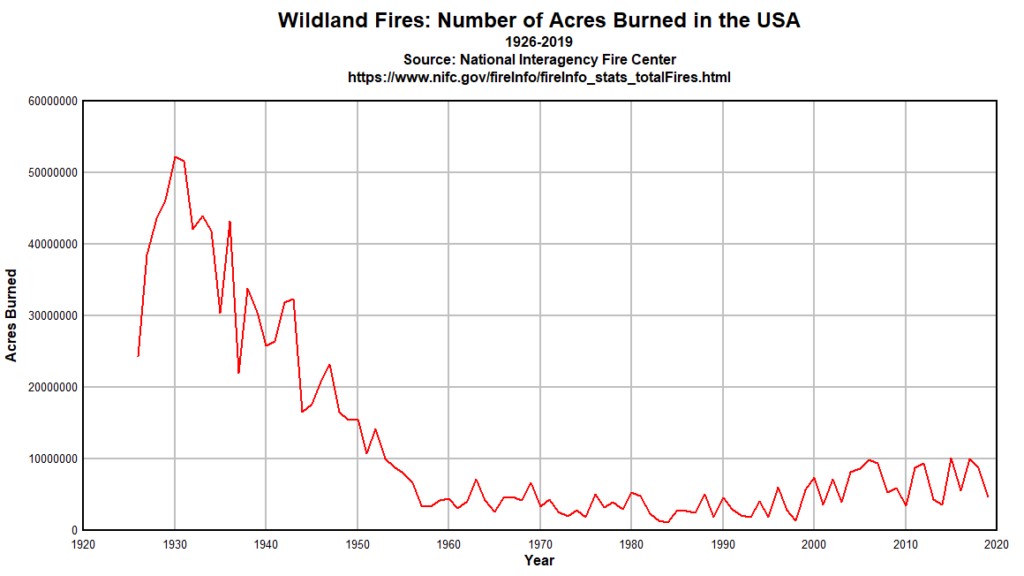
As reported in Climate at a Glance: Floods, neither U.S. government data nor the evidence summarized by the IPCC indicate floods are increasing in frequency or severity. National Oceanic and Atmospheric Administration records indicate a relatively flat trendline for flooding since 1895. And the IPCC says it has “low confidence” in any climate change impact regarding the frequency or severity of floods, going so far as to admit to having “low confidence” in even the “sign” of any changes—meaning, it is just as likely climate change is making floods less frequent and less severe as that it is making them more frequent or severe.
Hurricane numbers and the number of major hurricanes (Category 3 and above) have both declined over the past 30 years. The IPCC observes globally there is, “only low confidence for the attribution of any detectable changes in tropical cyclone activity to anthropogenic influences.”
And hurricane impacts in the United States are at an all-time low. Here are some facts MIT ignored concerning hurricanes, as reported in Climate at a Glance: Hurricanes: “The United States recently went more than a decade (2005 through 2017) without a major hurricane measuring Category 3 or higher, which is the longest such period in recorded history. The United States also recently experienced the fewest number of hurricane strikes in any eight-year period (2009 through 2017) in recorded history. Additionally, America’s most vulnerable state, Florida, recently concluded an 11-year period (2005 through 2016) without a landfalling hurricane of any size—the longest such period in recorded history. The Gulf of Mexico also recently) benefited from its longest hurricane-free period in recorded history (2013 through 2016).”
If droughts, wildfires, floods, and hurricanes aren’t increasing in number or severity, it is unclear which “extreme weather” events MIT is worrying about. Claims that climate change is making weather extremes worse may make for good fundraising at MIT, but they reflect poor scientific practice, which is supposed to be the pursuit of knowledge and truth.



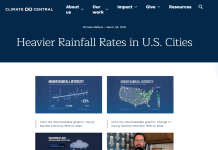
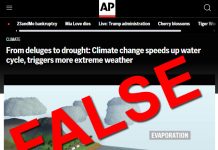





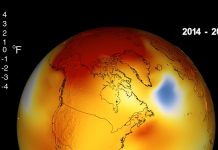
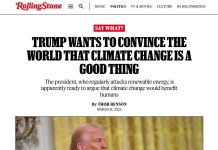

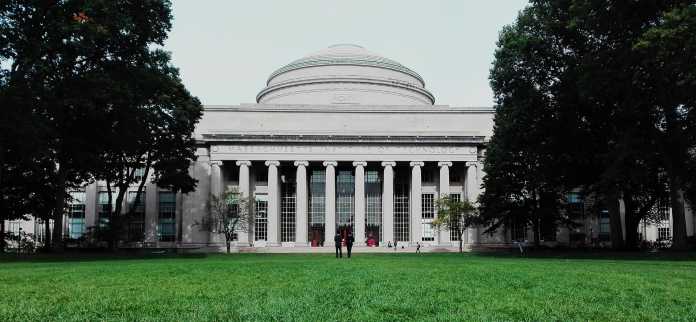




https://www.bbc.co.uk/news/science-environment-53601257